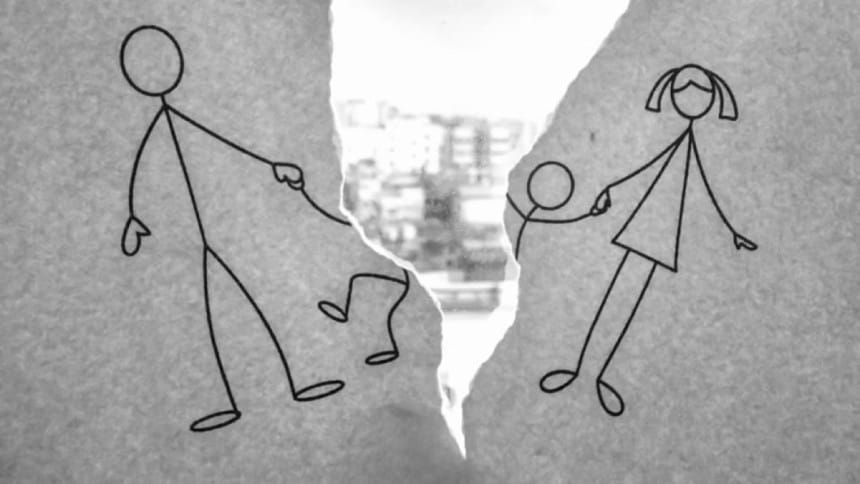Protecting the best interests of children during divorce

"The worst thing for the children when their parents divorce is to do 'middle-manning.' You have to tell your mother about your father and vice versa,"shared a young university student who had to go through this experience during her parents' divorce a few years ago.
The Bangladesh Sample Vital Statistics 2023 (BSVS 2023), a nationwide survey conducted by the Bangladesh Bureau of Statistics (BBS) on 308,032 families, revealed that out of every 10,000 individuals in the country, 11 were divorced. There is a slight decline in divorce from the previous year, when the rate had increased sharply after the Covid-19 pandemic. Overall, divorce is on the rise in society, and this trend is expected to continue.
There are many reasons why people may choose to separate from their partners, from a lack of mutual understanding to violence against women. Moreover, economic empowerment of women gives them the capacity to leave unhappy and abusive marriages. This article, however, is not about analysing the socioeconomic and cultural reasons for divorce. Rather, I would like to focus on the impact children suffer when their parents divorce.
Parental separation can affect children's lives in many ways, including changes in eating habits, behaviour, and exam results. Children may feel depressed and anxious, and there is also the risk of other mental health problems. Most studies on divorce show that the first one to three years are somewhat more difficult for children to adjust to the situation. Also, not all children are equally affected by parental separation. Those who have witnessed very high levels of conflict and bitterness between parents find some relief in separation.
The parents of a Swedish friend of mine divorced when he was 16 years old. He said, "Since I was seven or eight years old, I have seen a dysfunctional relationship between my parents. I myself asked them to get divorced when I reached adolescence. During my school final exams, the situation at home was insufferable because of their conflicts. A social worker arranged for me to be placed with another family. So, when my parents finally got divorced, I was relieved." My friend maintained a good relationship with both parents after the divorce. He is now a university teacher and a father of two children. There are countless examples of children succeeding in education, career and life after parental divorce.
Some teenagers in Bangladesh feel like my Swedish friend because the intense strife between their parents is unbearable for them. Many have witnessed physical and emotional abuse taking place in the relationship between their parents. According to child protection experts, if children witness abuse happening in front of them, it is also a form of child abuse. Children need to protected from this form of abuse as well.
Divorce is still a taboo subject and considered unacceptable by many in Bangladesh. The attitude is changing slowly, but the dominant social tendency is to protect the institution of marriage at any cost, even when it is no longer meaningful for the couple concerned. Therefore, children are under additional mental stress when parents are separated. Many are bullied at school and are subjected to harsh comments from neighbours and relatives. These discriminatory social attitudes need to change. People should stop making judgemental remarks about matters of others' lives without having the slightest idea about their realities.
Post-divorce complications can often become very bitter. There are disputes between parents over who will have custody of the child. A judgement is obtained if legal recourse is taken. However, the tension throughout the whole process can negatively impact the child. Some parents also prevent the child from seeing another parent, which is not acceptable from a legal point of view and a violation of children's rights. Except for a few extreme cases when a parent is a risk to the child, every parent has a right to interact with the child and perform their responsibilities. Having both parents in life is positive for the child's holistic development.
Some parents involve their children in discussions about alimony, division of property, etc, or try to sway them to their side. When parents fight or blame each other in front of their children, it leads the child to believe they must take sides, which is harmful for them. A parent's responsibility is to protect the child's best interests under all circumstances, but many fail to do so post-separation. Their anger and frustration are reflected in their behaviour towards their children.
Parents should consider the situation from their children's perspectives. It is beneficial for children to grow up in a peaceful environment with their parents. But if that cannot be ensured and separation becomes inevitable, the matter should be explained to the children as clearly as possible. Parents should listen carefully if their children express their feelings about the separation. Every child is different. Their reactions will also vary. It is important to let them know that feelings of anxiety, anger, and sadness are normal.
Parents have to learn how to manage the process in a mature way so that it does not affect children negatively. They are responsible for not involving children in the bitterness following separation. It is important for children to have reassurance that despite the separation, both parents will love them unconditionally. Children should be informed that even if the relationship between their parents changes, they can still love both of them.
Relatives, neighbours, and colleagues need to be sensitive to the people going through a divorce as well as their children. Teachers should also ensure that no student is discriminated against because of their parents' divorce. These will make it relatively easier for children to cope with the situation.
Laila Khondkar is an international development worker.
Views expressed in this article are the author's own.
Follow The Daily Star Opinion on Facebook for the latest opinions, commentaries and analyses by experts and professionals. To contribute your article or letter to The Daily Star Opinion, see our guidelines for submission.

 For all latest news, follow The Daily Star's Google News channel.
For all latest news, follow The Daily Star's Google News channel. 








Comments